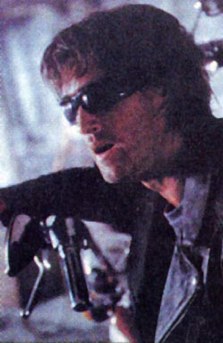National Post
March 1, 2002

A CBC movie with real street cred.
Written by Adrian Humphries
It is a few minutes into The Last Chapter, CBC's dramatic miniseries chronicling the growing pains of an outlaw motorcycle gang, before viewers get their first glimpse of the nototrious bikers.
Surely the director would have loved the introduction to be vivid - an in-your-face encounter with a behemoth proudly wearing his colours, the logos worn on a biker's back that have come to culturally define motorcycle gangs.
Director Richard Roy, however, held back.
Instead he introduces the Triple Sixers, a fictionalized but thinly veiled representation of the Hells Angels, the way a motorcycle gang is truly encountered: prospect member first.
Prospects, the wannabe gangsters who must prove their mettle before earning a coveted membership, do the grunt work - guard the bikes, shield members, make the coffee. Prospects wear but a wee slip of a crest on their backs - no grim logo or shocking name, just a semi-circle of letters saying what chapter they are auditioning for.
When a reporter approaches a cluster of a real-world motorccycle gang members, he is usually blocked by a prospect who does his best to frighten off the inquiry.
When police pull out cameras to update intelligence files with fresh pictures, a prospect will typically stand between the lens and the faces.
A prospect isn't much to look at, but he is usually the first thing seen when trying to get a peek at a bona fide motorcycle gang.
Likewise, when viewers of The Last Chapter meet the gang , the cameras first brushes past prospect members who open the gates of the spraling fortified bunker of the gang's Montreal chapter.
That introduction oozes authenticity, setting the stage for a miniseries with confidence enough to knowingly sacrifice visual excitement when legitimacy is the reward.
It is the admirable hallmark of The Last Chapter, a three-part fictionalized biker saga debuting Sunday at 8p.m that mirrors the Hells Angels explosive expansion into Ontario in December, 2000.
The presentation of the bikers - their clothing, actions, structure, criminal exploits, financial success and interaction with others - is deadly accurate, reflecting an obvious decision to forego many of the goonish stereotypes of the biker subculture.
The episodes highlite the division between gang members from Quebec and those in the rest of Canada, their international reach, the distrust between police agencies, and, despite the bikers' power and wealth, their sub-servience in the underworld to senior Mafia bosses.
The accuracy in both the criminal structure and the familial relationship between characters is likely due to the collective talents of two men guiding the story.
Claudio Luca, the producer, has a personal connection to the shadowy world of organized crime that he is reluctant to talk about. He is the son-in-law of Guiseppe "Pep" Cotroni, the younger brother and partner-in-crime of Vic Cotroni, the infamous former boss of the Mafia in Montreal.
"it is very touchy for me, quite frankly, and I don't know that much about it." Luca told the National Post. "My fater-in-law died in 1979, and when we had supper together, we didn't talk about those kinds of things - we talked about art."
Although his peripheral exposure to Cortoni's world did not give him great insight into the psychology of crime, he said it like effected his view of the way men who are notorious to outsiders can interact so intimately and compassionately with their families.
That comes through in The Last Chapter. Part of the miniseries' charm is that, like The Sopranos, the immensely popular American series about a Mafia boss, the domestic life of the gangsters is explored hand in hand with their exploits on the street.
If it was not Luca who provided the gritty details that make the presentation of the bikers so realistic that it looks like news footage, then it must be Guy Ouellette.
Ouellette retired last year as a sergeant with the Quebec provincial police's anti-biker squad and is one of the country's foremost motorcycle gang experts. He is a walking encyclopedia of biker knowledge, able to easily spit out dacts and figures, names and dates.
He is a technical advisor for the series and oversaw the replication of the day-to-day biker arcana.
Michael Ironside, a veteran star of such Hollywood fare as The Perfect Storm, Total Recall and Top Gun, leads the cast in The Last Chapter. He said Ouellette nudged everyone toward a more realistic portrayal. The actors and producers knew tehy had it right just by watching the mounting tension on Ouellette's face.
"In an episode, we hold the national convention of a bike group at a clubhouse," said Ironside. "We took all our clolours out and put them on, and I watched his face literally change. He was standing off camera, and all of a sudden there are 35 guys running around with patches and colours on, and his response was like a Pavlovian dog.
"I asked him, if he was all right, and he said, 'You can't do something for 30 years and then just shut it off. Everything here is so real.'"
In their drive for realism, the producers recognized the difficulty of portraying bikers who spend more time in strip clubs than their living rooms, and have a talent for spewing foulness from their mouths, with a typical CBC treatment.
The result is bare breasts and harsh language, all to be shown on a Sunday evening. The production is stronger for it; the series stands out from much of the Made in Canada fare, not only because of the lush realism but for its lack of parochial sentimentality.
Article and Image Scanned by: Soieange on March 1, 2002

